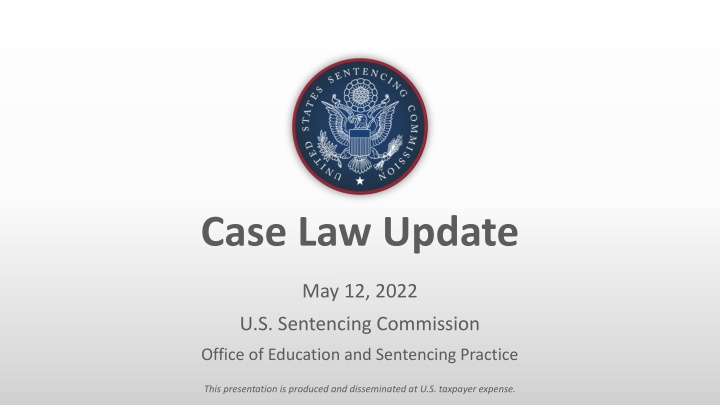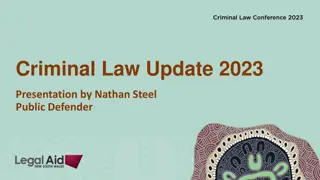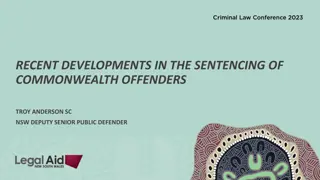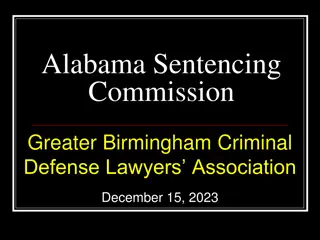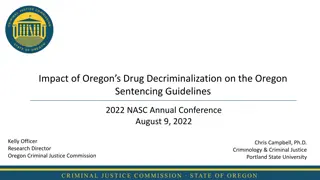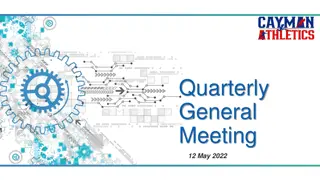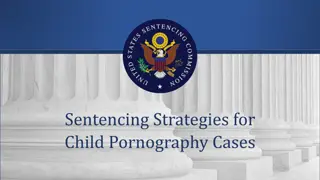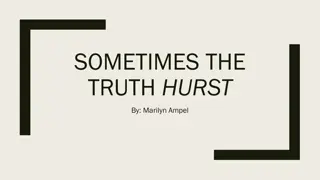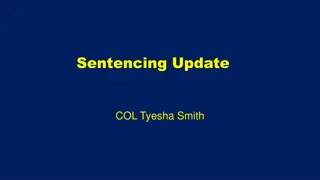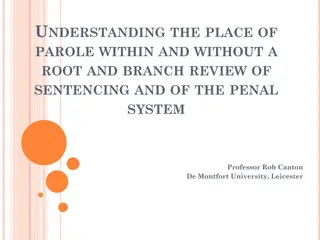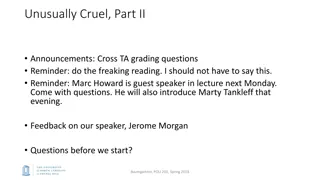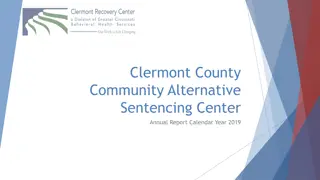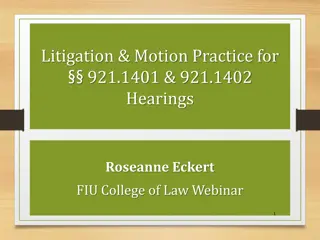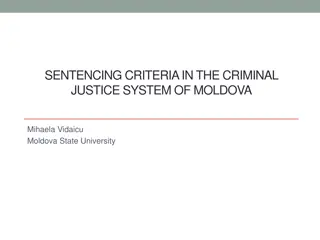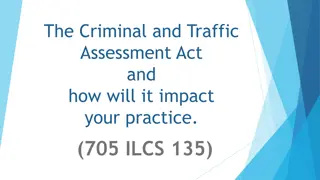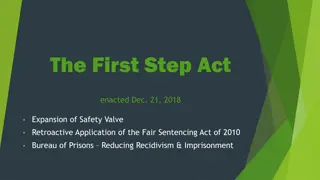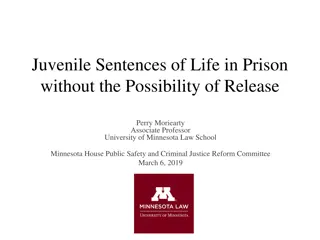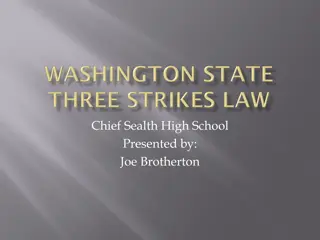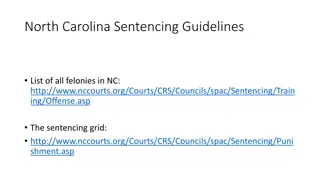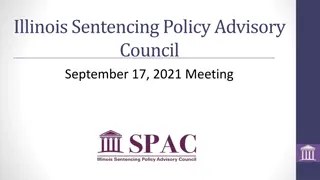U.S. Sentencing Commission Case Law Update
Explore recent Supreme Court decisions, Eighth Circuit rulings, and legal principles related to the Armed Career Criminal Act and specific cases like Wooden vs. United States. Learn about sentencing procedures, supervised release, and factors determining the classification of offenses in this informative session.
Download Presentation

Please find below an Image/Link to download the presentation.
The content on the website is provided AS IS for your information and personal use only. It may not be sold, licensed, or shared on other websites without obtaining consent from the author.If you encounter any issues during the download, it is possible that the publisher has removed the file from their server.
You are allowed to download the files provided on this website for personal or commercial use, subject to the condition that they are used lawfully. All files are the property of their respective owners.
The content on the website is provided AS IS for your information and personal use only. It may not be sold, licensed, or shared on other websites without obtaining consent from the author.
E N D
Presentation Transcript
Case Law Update May 12, 2022 U.S. Sentencing Commission Office of Education and Sentencing Practice This presentation is produced and disseminated at U.S. taxpayer expense.
Learning Objectives Your active engagement in this session will empower you to: Describe recent Supreme Court decisions on sentencing; Describe recent Eighth Circuit decisions on: 2B1.1; 3E1.1; sentencing procedure; and supervised release.
Which of the following cases were NOT heard during the October Term 2021? A. Borden B. Wooden C. Taylor D. Concepcion
Armed Career Criminal Act 18 U.S.C. 924(e) 15-year mandatory minimum if: 1. 18 U.S.C. 922(g); 2. Three prior convictions for violent felonies, serious drug offenses, or both; AND 3. The prior convictions were committed on occasions different from one another.
Wooden vs. United States 142 S. Ct. 1063 (2022) Mr. Wooden, in a single evening, burglarized ten units in a single storage facility. Mr. Wooden proceeded unit to unit by crushing the drywall. For this conduct, Mr. Wooden received 10 prior burglary convictions.
Wooden vs. United States 142 S. Ct. 1063 (2022) Mr. Wooden is later found guilty of felon in possession in federal court. Do Mr. Wooden s ten burglaries count as a single violent felony or ten violent felonies?
Wooden vs. United States 142 S. Ct. 1063 (2022) Offenses arising from a single criminal episode do not occur on different occasions.
3 Factors to Examine Timing of offenses Character & relationship of offenses
United States v. Taylor Docket No. 20-1459 Question presented: Whether 18 U.S.C. 924(c)(3)(A) s definition of crime of violence excludes attempted Hobbs Act robbery, in violation of 18 U.S.C. 1951(a).
Concepcion v. United States Docket No. 20-1650 Question presented: Whether, when deciding if it should impose a reduced sentence on an individual under Section 404(b) of the First Step Act of 2018, a district court must or may consider intervening legal and factual developments.
Credits Against Loss App. Note 3(E) (p. 91) Loss shall be reduced by: Certain benefits transferred (before detection) Collateral pledged (value at time of sentencing)
United States v. Luna 968 F.3d 922 (8th Cir. 2020) In a case about a recruitment-and-kickback scheme involving car-accident victims, a chiropractic clinic, and automobile insurers, 2B1.1 loss does not include the legitimate, compensable services provided by the chiropractic clinic.
Acceptance of Responsibility 3E1.1(a) If the defendant clearly demonstrates acceptance of responsibility for his offense, decrease the offense level by 2 levels.
Truthful Admissions Not Falsely Denying Relevant Conduct Timeliness of Acceptance What factors should a court consider in granting acceptance? Terminating Criminal Conduct 3E1.1, App. Note 1 Post-Offense Rehabilitation Voluntary Resignation Voluntary Restitution Voluntary Surrender
The defendant pleaded guilty only to possession of child pornography (CP). The evidence, however, proved that the defendant distributed CP. Is the defendant entitled to acceptance of responsibility if, at sentencing, he affirmatively denies distributing CP? Is the defendant entitled to acceptance? A. Yes B. No
United States v. Hennings 23 F.4th 820 (8th Cir. 2022) The court did not err when it denied acceptance of responsibility where the defendant made frivolous factual objections, claimed that he did not possess or distribute child pornography, and denied sexual conduct that he had previously admitted.
United States v. Cooper 998 F.3d 806 (8th Cir. 2021) A court may deny a 2-level reduction for acceptance under 3E1.1(a) based on a defendant s pre-plea criminal conduct.
Imagine the government agrees to seek acceptance in the plea agreement. Can the government use evidence of pre-plea misconduct to deny acceptance? A. Yes B. No
United States v. Collins 25 F.4th 1097 (8th Cir. 2022) The government breached the plea agreement, in which it agreed to recommend a 3E1.1 adjustment, by using the defendant s pre-plea conduct to challenge acceptance. The government s breach is not subject to harmless error review, and the government s breach here was not cured when the court applied the same guidelines range as the plea agreement.
United States v. Brown 5 F.4th 913 (8th Cir. 2021). The government breaches a plea agreement by arguing for a higher offense level than that specified in the plea agreement. Even if the government could cure this type of breach, here, its halfhearted and begrudging statement that the district court should follow the agreement was not enough.
Mandatory, Standard, & Special Conditions Mandatory Conditions are statutorily required. 18 U.S.C. 3583 and 5D1.3(a) Standard Conditions are recommended in all cases. 5D1.3(c) Special Conditions are recommended in some cases and circumstances. 5D1.3(d)
Requirements for Imposing Discretionary Conditions Reasonably related to: Offense/defendant; and Specific and general deterrence and rehabilitation. No greater deprivation of liberty than reasonably necessary.
United States v. Sterling 959 F.3d 855 (8th Cir. 2020) A condition of supervised release that required the defendant to disclose any financial information requested by the probation office, including unexpected financial gains, was vague and overbroad.
Revocation of Supervised Release 18 U.S.C. 3583(e)(3) The court may, after considering the factors set forth in 3553(a)(1), (a)(2)(B), (a)(2)(C), (a)(2)(D), (a)(4), (a)(5), (a)(6), and (a)(7) . . . revoke a term of supervised release. The statute does not reference seriousness of the offense, to promote respect for the law, and to provide just punishment.
In determining whether the revoke a defendants supervise release and impose a term of imprisonment, a court . . . A. Must consider 3553(a)(2)(A) B. May consider 3553(a)(2)(A) C. May not consider 3553(a)(2)(A)
United States v. Porter 974 F.3d 905 (8th Cir. 2020) The court did not give undue weight to an impermissible sentencing factor, that is, respect for the law, in revoking the defendant s supervised release.
Learning Outcomes You should now be able to: Describe recent Supreme Court decisions on sentencing; Describe recent Eighth Circuit decisions on: 2B1.1; 3E1.1; sentencing procedure; and supervised release.
